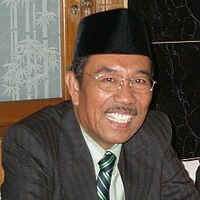MEMBAHAS PARADIGMA ILMU DAKWAH
MEMBAHAS PARADIGMA ILMU DAKWAH
Saya tentu sangat bersyukur diundang menjadi narasumber utama di dalam International Conference of Da’wah and Communication (ICONDAC), yang diselenggarakan oleh Fakultas Dakwah dan Komunikasi (FDK) pada 24-25 September 2019 di Amphitheatre Universitas Islam Negeri (UIN) Sunan Ampel Surabaya.
Hadir sebagai nara sumber ialah: Prof. Reevani Bustami, MA, PhD., dari University Sains Malaysia (USM), Dr. Phil. Hermin Indah Wahyuni, (Director of Center for Southeast Asian Social Studies-UGM Yogyakarta), Prof. Nadirsyah Hossein (Monash University, Australia), Syekh Dr. Muhammad Husayn Farg Sayyid Ahmad (Al Azhar University) dan Prof. Dr. Moh. Ali Aziz, MAg (UIN Sunan Ampel Surabaya).
Saya menyampaikan beberapa hal terutama dalam kaitannya dengan posisi ilmu Dakwah dan Komunikasi, terutama dilihat dari paradigm dan pengembangannya ke depan.
Pertama, saya sampaikan pertanyaan dasar, “Is the science of da’wah already in the “established” area as it develops other sciences in the cluster of religion study? This is the question that I think is necessary to obtain certain answers from lecturers who should be directly or indirectly involved in the development of da’wah study.
This paper takes effort to examine the scientific development of da’wah and its scientific application from the content analysis perspective which is often used as a perspective to view works or documents in the scientific field. On this context, indeed is an analysis of the work among observers and lecturers of the Faculty of Da’wah and Science Communication which during that time had gained an understanding of the da’wah science and various variants of its derivatives.
Kedua, posisi dan paradigm ilmu dakwah. Mengenai posisi ilmu dan beberapa paradigm di dalam kajian ilmu dakwah dapat dinyatakan sebagai berikut: I stated that the science of da’wah is the science of religion, as is the existence of tarbiyah, sharia, ushululuddin, commentary, hadith science and so on. Of this view, it is Abdullah, who states that the science of da’wah is religious knowledge. I think this view must be confirmed, because it really is unlikely that the da’wah science becomes the part of social science.
If we look at the works produced by the da’wah scientist, presumably it can be mapped based on the da’wah scientific paradigm, namely: paradigm factor, system, developmentalism, interpretative and participatory. Based on the above mapping paradigm, it can be seen that in the meantime, most experts in da’wah science still exist and develop the da’wah paradigm factor.
This is certainly due to the fact that the discussion around the science of da’wah is inside this paradigm. In Faculty of Da’wah and Communication of UIN Sunan Ampel, it can be known that the paradigm factor is ingrained, especially around the 1980s until the 1990s even now especially in Communication and Study programs of Islamic Broadcasting (KPI). These studies are related to the relationship between da’wah factors.
In addition to this, there are also a number of study areas that are interdisciplinary and cross-disciplinary, which have not yet gotten the optimal touch based on the scientific studies posted. For example, the interpretation of da’wah, da’wah hadith, sociology of da’wah, anthropology of da’wah, da’wah politics and so on. The interpretation of da’wah and da’wah hadith is an interdisciplinary study, because it is the field of religious science, whereas the sociology of da’wah, anthropology of da’wah, da’wah political studies, da’wah law studies, and so on is interdisciplinary study or fields that are in between has also not been received adequate touch.
Ketiga, ada beberapa catatan penting untuk pengembangan ilmu dakwah ke depan, di antaranya ialah: Lecturer Resources at the Faculty of Da’wah and Communication are sufficient. Today, there are many lecturers at the Faculty of Da’wah and Communication who hold doctoral degree with various studies. Their presence is certainly very meaningful for the development of da’wah science indeed really needs rapid development.
Therefore, there are a few notes to notice:
- Most studies of da’wah are within the da’wah factor paradigm, so that other paradigms such as the paradigm system, paradigm developmentalism and interpretive paradigm have not yet obtained an adequate proportion of studies.
- A consortium of experts in the field of da’wah is needed in collaboration with other sciences, to discuss and develop mono-disciplinary, interdisciplinary and cross-disciplinary and even multi-disciplinary studies.
- Efforts are needed to write and develop studies in interdisciplinary or cross-disciplinary studies and even multidisciplinary in the science of da’wah. I consider that most studies of da’wah interdisciplinary, and cross disciplinary are also immature. If it already exists (da’wah psychology, da’wah sociology and da’wah management) it is still an introductory study and has not been developed yet in a deeper direction. Moreover, interdisciplinary and cross-disciplinary studies (da’wah anthropology, da’wah political studies, da’wah law studies, etc.) have not yet been developed optimally.
I think that accelerating steps are needed to achieve the development of da’wah science that is responsive to the times and is also relevant to the desire to develop a multidisciplinary of da’wah science. The task of the lecturers of the Da’wah and Communication Faculty is not only to teach but also to conduct research and then publish it in the form of books and journals in various confessions.
Wallahu a’lam bi al shawab
